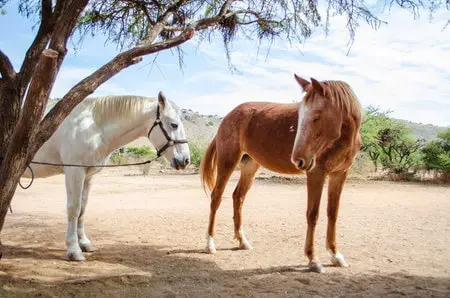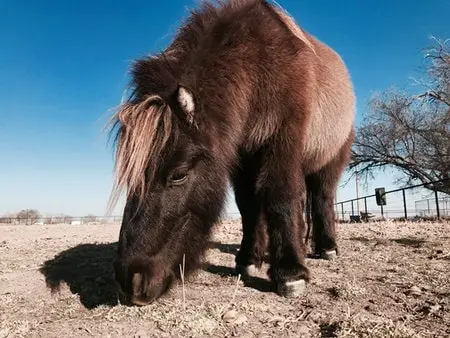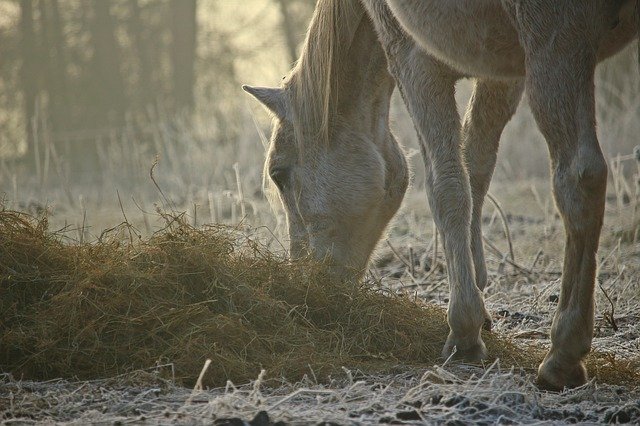If you’re asking, “Why does my horse eat dirt?” then your question might not be as easy to answer. There are a number of potential reasons that horses might do this and it depends on the exact situation with each individual case.
Horses eat dirt for a variety of reasons. The most common is salt deficiency, but boredom and ulcers are also culprits to look out for. Changes in diet or intestinal parasites (worms) can be coincidences that lead the horse into eating soil overall as well.
It is normal for some horses to partake in this behavior every now and again, but when they start doing it continuously or excessively after having done so only occasionally before there may be more cause for concern than just assuming their diet needs an adjustment or boredom sets in with time spent indoors all day by themselves .
Why Does my Horse Want to Eat Dirt
Depression & Boredom
If you’ve ever seen a horse eat dirt, it’s because the animal is bored or depressed.
A fascinating study by Oxford University (1) found that when horses are changed from living in wide-open spaces to being kept in stalls for long periods of time – they became listless and ate their own bedding or even sand!

Horses are natural roamers and grazers, spending long days munching on grass and roaming. They are open-range animals. When we take them from this environment to a stall they get bored or depressed so they start eating dirt which is not good for their digestive system because it’s packed with bacteria that can cause colic in horses but also causes stomach ulcers if the horse has been grazing before hand!
If your horse is feeling down in the dumps, try putting a companion animal by his stall or providing some new toys. You should also allow him as much turnout time as possible and play music to help lift his spirits!
Illness or Digestive Issues
The inside of a horse’s stomach is like the surface of mars-covered with bacteria, irritants and other substances that can wear away at its tissues. Gastric ulcers are essentially wounds in this sensitive piece of flesh which often leads to weight loss, irritability or lack energy as well as change in appetite – especially for dirt!
Horses with ulcers often have trouble eating, feel sick or depressed a lot of the time, get weight loss; they may also eat dirt like an animal would do if it was in pain from something else around them – specifically when their feet were wounded for example.
In some cases this gives temporary relief but no one has found out yet what is actually healing about eating dirt because researchers haven’t looked into these things enough as far as I know.
It may not be scientifically proven yet but horses have been seen eating dirty hay just after being released from strenuous activities such as intense training or competitive showing so it could very well provide relief even if some experts don’t believe it will heal their wound any faster.
Feeding Habits
When transitioning to a new feed, it is best not to introduce too much of the new food at once. A horse’s digestive system can be sensitive and needs time adjust when adding more than one type of hay or grain into their diet. Start by mixing 80% current fodder with 20% formerly offered foods for a few days before gradually increasing the ratio until you are feeding 100% from your newly introduced source!

It takes the guts of two weeks for horses’ digestive systems to adjust when introducing new food types or hay. To start off transitioning your horse’s diet, mix small quantities of their current feed with an equal quantity of the new type starting at 80% and gradually increasing until you reach 100%.
The best way to ensure a smooth transition is by always monitoring your horse’s weight and eating pattern. If he begins dropping pounds, quits eating or his coat starts looking shabby, consider adjusting their feed or slowing down the rate of change. Sometimes it can take up to four weeks for some horses before they are able to successfully make the switch in diet without any problems at all!
Horses will eat dirt because of a transition to a new diet for these two reasons: 1) They have not yet adjusted to the mineral content in this new feed, and 2) they are eating fast then getting bored.
External Bodies & Parasites
Internal parasites are a common issue in horses. The most common, which should be dewormed every six months to prevent colic and other health issues, is bots.
Horses are susceptible to all sorts of parasites, and horse owners should have a deworming protocol for each animal on their property. Internal parasites can cause colic or respiratory problems in horses who eat dirt.
Internal parasites cause colic, respiratory and performance issues like lameness which all horse owners should take seriously. A deworming protocol for each of their animals just as they would any other pet.

Does Eating Mud & Dirt Harm A Horse
Horses are natural hunters and scavengers, seeking out foods that provide the nutrients they need to survive. This is true for horses kept in poor conditions without access to proper nutrition as well; dirt may be just what a horse needs!
Horses can supplement their diets by eating dirt like any other hunter-scavenger would do naturally. If you notice your horse has an insatiable appetite for soil or if he starts refusing his regular feedings, make sure you’re not neglecting him of some vital nutrient.
Horses who are deprived of a healthy diet may find the minerals they need in dirt.
If you’re noticing your equine friend doing something that is rather odd for their species, like snacking on some soil during an afternoon stroll in the paddock? It might not actually be so bad! Horses have been known to eat small amounts of mud as well because horses kept in poor conditions without access to proper nutrients can supplement their diet by consuming these rich minerals and elements from earthy sources such as soils.#
If your horse has a healthy diet and continues to consume dirt, he likely has an ulcer or sand colic.
Equine Ulcer
When a horse eats sand, it can cause an ulcer. The horse’s stomach is not a self-cleaning oven. It can’t digest sand, so when it eats enough to fill the entire thing up with grittiness, that may cause an ulcer or other problems in their intestines and lower organs.
Sand builds up in the lower portion of their intestine and causes cramping, diarrhea or constipation.
Equine Sand Colic
Although the reasons for eating sand aren’t well studied, it is known that horses eat dirt and sand when they are bored. Horses can develop a type of colic called “sand colic”.
While there is an easy enough cure (2) for it, this condition causes weight loss, diarrhea, and general signs of distress in animals suffering from this disorder.

